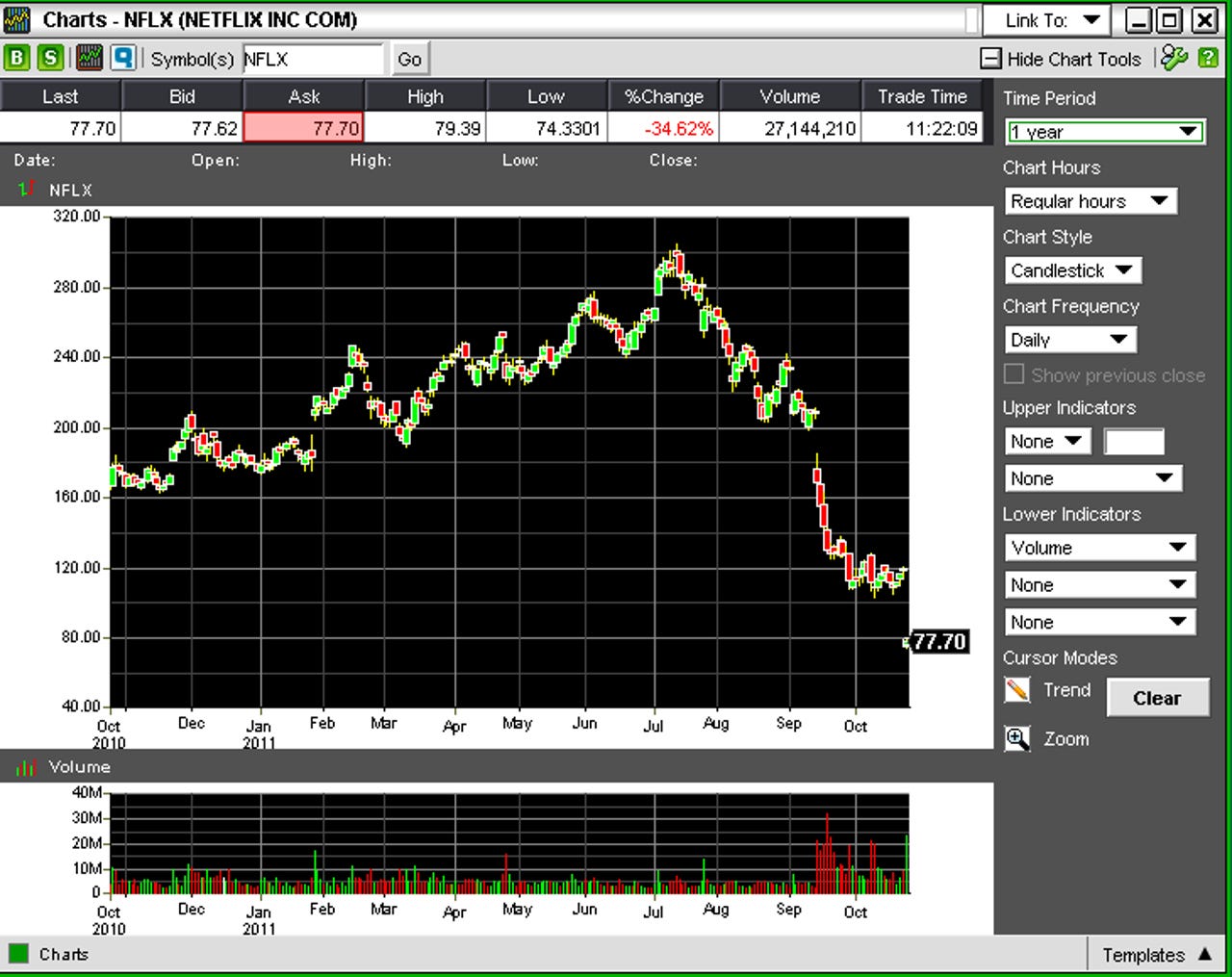Netflix's big collapse: Do you believe in streaming, international expansion?

Netflix shares are in free-fall following a rocky third quarter, customer service mishaps and projections for early 2012 losses as it ramps up an international expansion. At some point though, Netflix will look like a bargain as long as you believe in the case for streaming media and international expansion.
Shares of Netflix were down more than 35 percent in early trading. The big issue is that the company projected a first quarter loss in the first quarter as it launches its U.K. and Ireland streaming service. Netflix will hold back on further international expansion until it returns to profitability.
Needless to say, Wall Street analysts were downgrading Netflix and hopping off the bandwagon like rats on a ship. Add it up and Netflix has gone from darling to dog in just a few months. The consensus appears to be that Netflix moved too quickly to streaming and hurt its reputation and customer base with a series of botched moves. In other words, CEO Reed Hastings went for creative destruction and only got the destruction part.
More: CNET: Even as shares plummet, Netflix a worthwhile buy, analyst says | Netflix's latest show: When creative destruction attacks | Netflix's debacle continues: Fourth quarter outlook horrid
The larger question here is whether Netflix will be a bargain at some point---even a screaming buy. The five-year chart shows little support until $50 so things could get worse. But the long-term story of Netflix's move to streaming service and international markets makes sense. Navigating the shift could be tricky. Hastings likened the DVD business to AOL's dial-up service---a good business that will decline over time.
On the third quarter conference call with analysts Hastings said:
It will probably be something like AOL dial-up from 2002 to today, where it's a steady decline every year of a little bit, but there is a long-term residual market. And there's very little fixed cost in the business. So that's not a material cut off of its efficiency, it's almost all variable cost. The postage, the labor, all of those aspects.
Analysts were mixed on Netflix. In the long run, Netflix's moves make sense. Today, those moves are causing a lot of pain. The reality is that no one knows where Netflix is headed---even company management. Here are three scenarios to ponder:
The best case: Michael Olson, an analyst at Piper Jaffray, said:
We believe Netflix continues to be the service best positioned to leverage the global video streaming opportunity. The company moved too fast towards streaming and now must win back investor confidence; we do not expect that will happen overnight, but over the next few quarters investor optimism will shift more positive following this reset of the business.
The base case: Netflix weathers a few rocky quarters, but ultimately makes the transition to streaming. Customers give Netflix a chance and defections stop. Netflix is bruised for a year or two, but then recovers to an increasingly competitive landscape. Oppenheimer analyst Jason Helfstein said:
Netflix's worse than expected 4Q guidance should mark the end of this ugly episode. Investors will likely remain scarred near-term.
The worst case: Netflix will see more defections as its Starz partnership ends. Morgan Stanley analyst Scott Devitt said in a research note that Netflix faces a rocky future. Devitt's choice quotes:
We thought Netflix had overcome its moment of miscommunication and was ready to repair the damage to reputation. We took the wrong side of the trade. After learning of Netflix’s decision to initiate an investment cycle into the UK and Ireland at a time when its domestic business is reeling from subscriber losses and content cost pressures, we decided to close our Research Tactical Idea.
And.
Despite management’s analysis of time spent watching serialized TV content vs. Starz content, we believe subscribers are largely unaware that their Starz content will cease to exist after February 2012.
And.
Despite management’s analysis of content and subscriber habits, the bottom line is that Netflix will pay more for content tomorrow than it is paying today because there are other, credible buyers in the market for that content. Amazon’s acquisition of content has a collateral damage effect on Netflix.
Ouch.
Related: Netflix’s Qwikster retreat makes sense, but looks skittish
- Netflix under pressure to land streaming content deals
- Netflix split to set up Amazon streaming merger?
- Netflix’s mea culpa disaster: ‘Seems like a panic move’
- With service split, Netflix overlooks customer experience
- Netflix wrestles with innovator’s dilemma; Customers pan ‘Qwikstupid’ idea
- Netflix cuts subscriber targets: Customer rebellion or just a blip?
- Netflix, Starz to break up: One crazy ride ahead to Feb. 28
- Disney chief Iger: Digital evolving too fast for long-term content deals
- Amazon touts video titles, just as Netflix customers pick plans
- Netflix’s rough weekend: Sign of things to come through October
